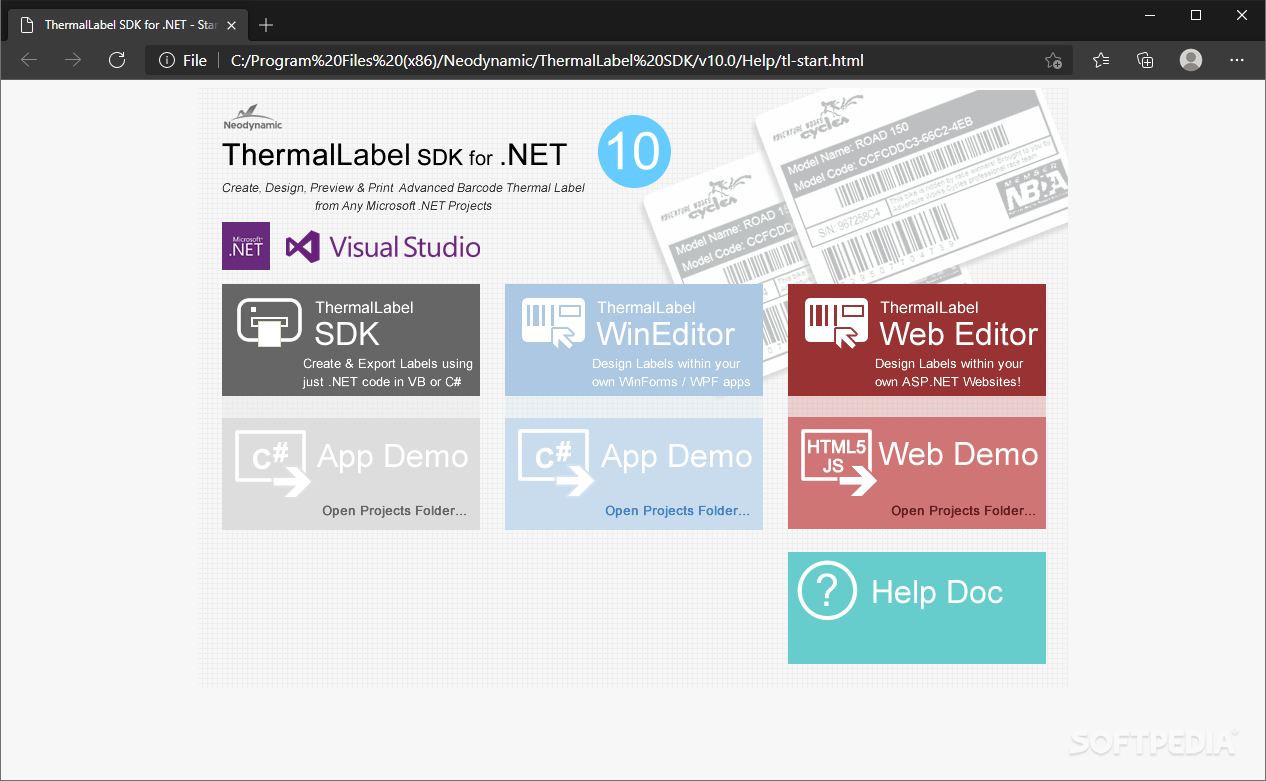
ThermalLabel SDK for .NET
10.0.21.823Design barcode labels, print them to ZPL/EPL printers, or export them to image and PDF files with the help of this class library
ThermalLabel SDK for .NET has been built as a lightweight class library (DLL) meant to provide users with the possibility to design barcode labels, as well as to print them to any Zebra ZPL/EPL-compatible Thermal Printers. The tool allows users to do so by simply writing code in Visual Basic .Net or in C#.
The component comes with support for creating a wide range of labels, starting from the most simple layouts and going up to complex ones. Moreover, it includes support for text, images, RFID tags, shapes and other type of graphics.
ThermalLabel SDK for .NET delivers a unified object model designed to help users build their label designs effortlessly, as well as to print them to ZPL (Zebra Programming Language), ZPL II, and EPL (Eltron Programming Language) printers.
The utility has been created with .NET Data Binding scenarios in mind, thus providing users with the possibility to bind text and barcode items to their .NET data sources. Moreover, the program features support for data types used such scenarios, including Arrays, Lists, ADO.NET Access, CSV, and XML DataSet.
ThermalLabel SDK for .NET allows users to take advantage of counters, which can be used to index data items based on an increment or decrement value. Thus, data items increase or decrease by the selected value with each label print.
The DLL also includes Data Masking capabilities, so that users can serialize items through simply defining Mask string and an increment string, a feature that can prove highly useful when batch printing labels with serialized items.
With the help of ThermalLabel SDK for .NET, users can preview output label content and can also export it to various image formats, such as BMP, GIF, JPEG or TIFF. Moreover, the tool allows users to save their labels as PDF files.
The component comes with support for creating a wide range of labels, starting from the most simple layouts and going up to complex ones. Moreover, it includes support for text, images, RFID tags, shapes and other type of graphics.
ThermalLabel SDK for .NET delivers a unified object model designed to help users build their label designs effortlessly, as well as to print them to ZPL (Zebra Programming Language), ZPL II, and EPL (Eltron Programming Language) printers.
The utility has been created with .NET Data Binding scenarios in mind, thus providing users with the possibility to bind text and barcode items to their .NET data sources. Moreover, the program features support for data types used such scenarios, including Arrays, Lists, ADO.NET Access, CSV, and XML DataSet.
ThermalLabel SDK for .NET allows users to take advantage of counters, which can be used to index data items based on an increment or decrement value. Thus, data items increase or decrease by the selected value with each label print.
The DLL also includes Data Masking capabilities, so that users can serialize items through simply defining Mask string and an increment string, a feature that can prove highly useful when batch printing labels with serialized items.
With the help of ThermalLabel SDK for .NET, users can preview output label content and can also export it to various image formats, such as BMP, GIF, JPEG or TIFF. Moreover, the tool allows users to save their labels as PDF files.
System requirements
7.3 MB
Info
Update Date
Aug 24 2021
Version
10.0.21.823
License
Shareware
Created By
Neodynamic
Related software Development







